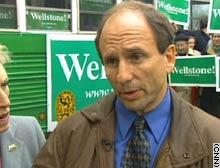Starcats
NEWSMAKERS

Paul Wellstone


StarcatsNEWSMAKERS 
Paul Wellstone
 |
CommentaryPaul Wellstone, 1944-2002U.S. Sen. Paul Wellstone was the senior senator from Minnesota, and served on six committees: Foreign Relations; Agriculture, Nutrition & Forestry; Health, Education, Labor & Pensions; Indian Affairs; Small Business, and Veterans' Affairs. He has two surviving sons, David and Mark, and six grandchildren. His wife of nearly 40 years, Sheila, and only daughter, Marcia, were also killed in the plane crash. Wellstone had one of the most liberal voting records in Congress. Polls had put Wellstone in a tight race with Republican challenger Norm Coleman, a former mayor of St. Paul and President Bush's pick to challenge the two-term incumbent. Here's a timeline: 1944: Born to Russian immigrants Leon, a writer, and Minnie Wellstone, a cafeteria worker, in Arlington, Va., where he is raised 1963: Marries Sheila Ison 1965: Graduates with a B.A. in political science from the University of North Carolina 1969: Earns a Ph.D. in political science from UNC and settles in Minnesota after accepting a teaching position at Carleton College in Northfield, a post he'd hold for 21 years 1978: Publishes "How the Rural Poor Got Power: Narrative of a Grassroots Organizer" Next: 1998-2002 1981-1996 1981: Publishes "Powerline: The First Battle of America's Energy War," with Barry M. Casper 1988: Cochairs Jesse Jackson's 1988 presidential campaign in Minnesota 1990: Launches and wins a longshot Senate bid, campaigning across the state in his trademark "Green Bus" and unseating incumbent Republican Sen. Rudy Boschwitz 1991: Successfully leads opposition to an energy bill that would have opened Alaska's Arctic National Wildlife Refuge to oil drilling 1996: Along with Pete Domenici, he wins mental-health coverage in health insurance. Wins re-election, outspending challenger Boschwitz $7.4 million to $4.3 million. He says he will step down after his second term. 1998- 2002 1998: Announces that he will almost certainly run for president and becomes one of the first to set up an exploratory committee. 1999: Announces in January he will not run after all, citing his injured back. A few months later, he endorses and begins campaigning for Bill Bradley. In Congress, he is one of three senators to oppose national-missile-defense legislation. 2001: Publishes "The Conscience of a Liberal: Reclaiming the Compassionate Agenda." He renegs on his promise to seek only two terms, citing the Democrats' one-seat majority. Says Wellstone: "So much has changed, and so much is at stake." 2002: In February, he discloses that he has mild multiple sclerosis. On Oct. 11, he is one of 23 senators to vote against authorizing the use of force in Iraq. On Oct. 25, he dies in plane crash with his wife and daughter while on his way to the funeral for a state lawmaker's father. "The Wellstone Effect isn’t likely to win the House back for the Democrats, but in a closely-divided country, it should help hold the Senate for them. Voters like a balance in Washington, a healthy debate. They liked seeing that Wellstone voted against the war resolution, even if they favored it. In recent years they have been reluctant to hand the White House, Senate and House to the same party. This year shouldn’t be any different, thanks in part to Paul Wellstone. It wouldn’t be the crowning legacy he’d have chosen, but he’d have been happy about it." Timeline courtesy of MSNBC
|